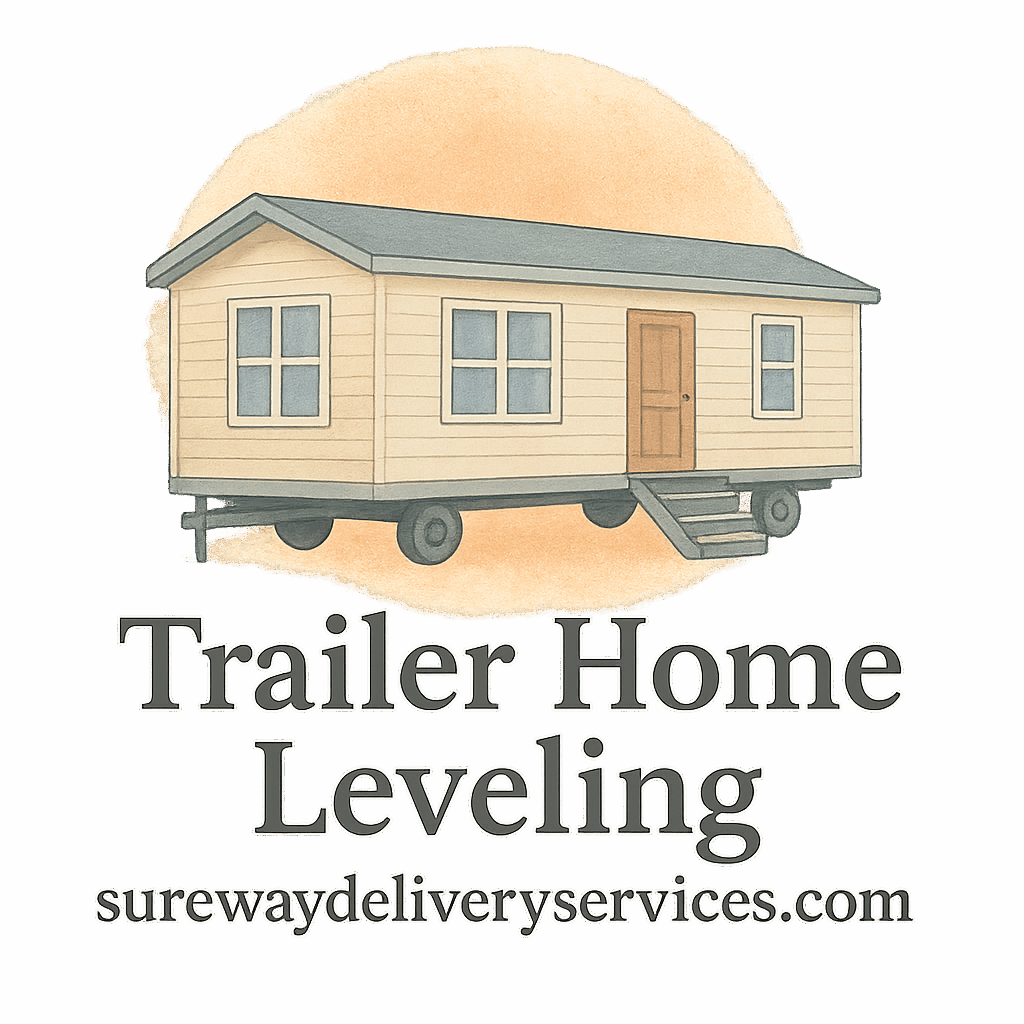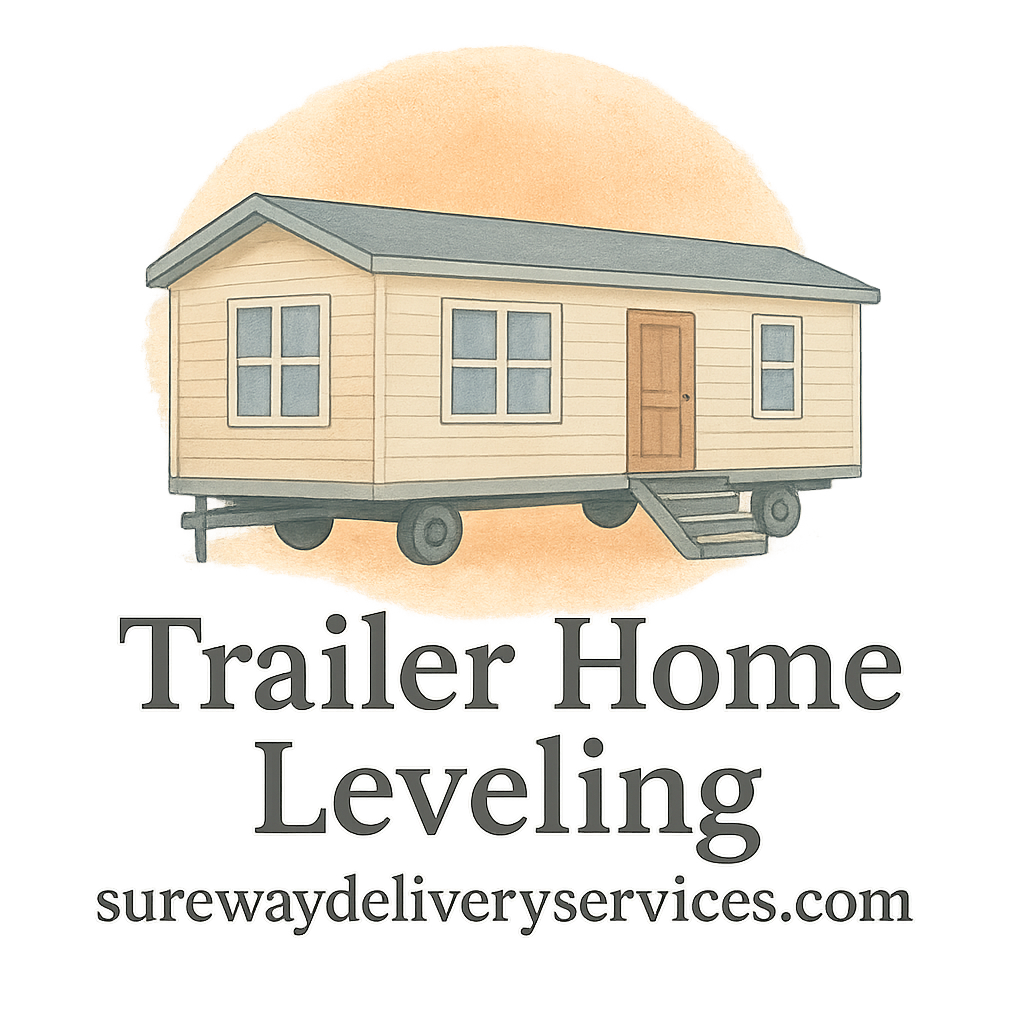Introduction
Thinking about getting your trailer home leveled? You’re not alone. Thousands of homeowners find themselves googling “Why does my trailer tilt like it’s on a seesaw?” If your furniture is sliding or doors aren’t closing properly, it might be time for leveling. But here’s the big question — what does it cost?
Spoiler: it’s not a one-size-fits-all answer. There are multiple factors that impact home leveling costs for trailers, and today, we’re breaking them down for you — all 9 of them.
Let’s dive in and help you budget wisely while keeping your trailer safe and sound.
1. Type of Trailer Home
Single-Wide vs. Double-Wide vs. Triple-Wide
The size and type of your trailer have a huge impact on the cost. A single-wide is simpler and faster to level, which translates into lower costs. Double-wide and triple-wide trailers require more jacks, more labor, and more materials.
Bigger home = bigger cost. Makes sense, right?
Construction Material Differences
Some trailer homes are built with lightweight materials, while others use reinforced structures or steel frames. Heavier homes need industrial jacks and reinforced supports, which can spike your leveling bill.
For a great breakdown of trailer types, check out this introductory guide.
2. Extent of Leveling Required
Slight Tilt vs. Severe Unevenness
If your trailer only needs a minor adjustment, you might get away with a couple hundred bucks. But if it’s drastically leaning — say you’re rolling off your couch — it’s going to need more work, which means more money.
Foundation Shifts and Sinking
Leveling is one thing, but when the ground beneath your trailer has shifted or sunk, that’s a whole new ball game. It requires stabilizing the foundation, which adds cost and time.
Curious how much that could be? Visit our budgeting guide for more details.
3. Soil Conditions and Terrain
Sandy vs. Clay vs. Rocky Ground
Where your trailer sits plays a huge role. Sandy soil tends to shift more, clay can swell, and rocky terrain might need customized leveling tools. All these conditions affect how your leveling service is performed — and priced.
Drainage and Water Damage Risks
If water isn’t draining properly around your trailer, it can erode the ground beneath and cause uneven settling. This can lead to repeated leveling jobs, not just a one-time fix. Investing in prevention saves you money down the road.
Don’t forget — regular inspection and maintenance can prevent most water-related surprises.

4. Tools and Equipment Needed
Hydraulic Jacks, Laser Levels & More
The more specialized the equipment, the higher the cost. For example, leveling a trailer with just screw jacks is cheap but risky. Professionals use laser levels, water levels, and hydraulic jacks for accuracy and safety.
Explore the tools and techniques experts use in trailer leveling.
Availability of Specialized Equipment
If you’re in a rural area, the contractor may need to bring equipment from far away — and yes, you’ll likely foot the travel bill.
Check out our post on jacks and essential tools for a deeper look.
5. Labor Costs and Contractor Fees
DIY vs. Professional Services
Sure, you could try to level your trailer yourself — but without the right tools, it’s like performing surgery with a butter knife. Hiring a pro ensures safety, durability, and often includes a warranty.
If you’re not sure who to hire, start with our contractor hiring guide.
Local Labor Market Rates
Depending on where you live, the average hourly rate can vary from $50 to $150. Urban contractors often charge more, while rural contractors may offer package deals.
Explore local service packages and compare customer reviews.
6. Accessibility and Site Location
Urban vs. Rural Properties
If your trailer is in a tight urban lot, contractors might struggle to maneuver their tools. On the flip side, if you’re way out in the boonies, they might charge travel fees.
Obstacles and Clearance Space
Got bushes, fences, or storage units blocking access? Clearing them out adds time — and you guessed it — cost.
Pro tip: Use our checklist before the crew arrives.
7. Time of Year and Weather Conditions
Peak Season vs. Off-Season
Like most industries, trailer leveling has a busy season. Spring and fall are prime time, so expect higher prices. Booking in the off-season could land you a discount.
Weather-Related Challenges
Rain, snow, or extreme heat can slow down the job. If a contractor has to return another day, they may charge extra for multiple visits.
Avoid costly rescheduling by checking your area’s seasonal trailer issues.
8. Permits and Legal Requirements
Local Regulations and Inspection Costs
Some counties or trailer parks require permits for leveling jobs. These could cost $50–$200 depending on the area. And yes, you’ll probably need a post-leveling inspection, too.
Visit our inspection hub for state-specific details.
HOA or Park Rules
If you live in a trailer park, they might have their own rules about who can do the work or what time it can be done. These rules can complicate — and inflate — your costs.
9. Additional Repairs or Services Needed
Skirting, Plumbing, Anchors, and Tie-downs
Sometimes leveling reveals other issues like cracked skirting, busted pipes, or unsteady anchors. These repairs are extra — so always budget more than the quote.
Maintenance Inspections and Follow-Ups
Leveling your trailer isn’t a “set it and forget it” task. Ongoing trailer maintenance ensures stability and saves you from future surprises.
You can explore more tips in our maintenance guide.
Conclusion
Trailer home leveling isn’t just about straightening your floor — it’s about safeguarding your comfort, safety, and investment. The home leveling costs for trailers depend on a wide range of factors from trailer type and soil conditions to labor rates and weather.
By understanding these 9 key factors, you’re better equipped to plan, budget, and avoid surprises. And remember, a little prep now can save you hundreds (even thousands) later.
Still not sure where to begin? Dive into our basics introduction or browse all things home leveling to get started.
FAQs
1. What is the average cost of trailer home leveling?
Most leveling jobs range from $300 to $1,500, depending on the factors we’ve discussed. Larger, older, or severely unlevel trailers can cost more.
2. How do I know if my trailer needs leveling?
Common signs include doors sticking, windows jamming, uneven floors, or water pooling around your home. Use our signs checklist to evaluate your trailer.
3. Can I level my trailer myself to save money?
You can — but it’s risky. Incorrect leveling can cause damage or injury. Always weigh the price of hiring a pro against the cost of mistakes.
4. How often should I inspect my trailer for leveling?
At least once a year. Schedule an annual inspection or check after big weather changes.
5. What tools are required for trailer home leveling?
The essentials include hydraulic jacks, levels, and safety blocks. More advanced projects may need specialized tools.
6. Do all types of trailers cost the same to level?
Nope! Trailer details like size, frame material, and age all affect the cost.
7. Are there warning signs before a trailer becomes unlevel?
Yes — small shifts, like tiny floor dips or sticking doors, often show up before major tilts. Stay ahead with these trailer tips.


